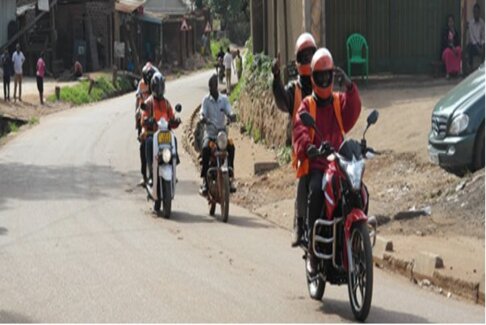Sustainable e-mobility





Description
The Sustainable Energy Solutions Catalogue is designed for users both within and outside the scope of SESA. Inside SESA, it offers an introduction to solutions that can be utilized in collaboration with various stakeholders, including local governments and civil society. Additionally, the catalogue updates users within the project about activities at SESA validation and replication sites. Externally, it informs users about the various solutions tested during SESA project implementation and serves as a comprehensive source of introductory information on sustainable energy solutions for a diverse set of stakeholders.
The factsheet on sustainable e-mobility focuses on key facts about e-mobility solutions in the African context such as technologies, business models and impact areas as well as approaches that help ensure the viability and long-term success of sustainable e-mobility in the African context. The factsheet focuses on light electric vehicles (EVs) such as e-motorcycles, e-tuk-tuks or tricycles, e-bicycles and e-cargo bikes. 2-and 3-wheeled vehicles represent an important means of transport in African urban and rural areas and they are the most common types of EVs deployed there.

Solutions Plus E-mobility Toolbox
The Solutions Plus e-Mobility Toolbox is an online information portal that supports the development, implementation and monitoring of innovative electric mobility solutions. The platform contains tools and information materials in various areas, including: vehicles, business and finance, demonstrations, integration, operation, policy, sustainability, and users.
https://emobility.tools/
Digital toolkit for energy and mobility
This toolkit addresses the energy and mobility nexus and helps to bridge the gap between the transport and energy sectors when developing sustainable, and energy-efficient mobility projects. It looks into three policies and global experience available to take action on the transport and energy sector nexus, including “Promote Public Discussion on New Mobility Solutions”, “Expand Public Transport Infrastructure”, and “Plan for Integrated Multimodal Transport Networks”.
https://www.sum4all.org/data/files/digital_toolkit_for_energy_and_mobility_complete.pdf
UNEP Global Electric Mobility Programme
The Global Electric Mobility Programme by UNEP (United Nations Environment Programme) supports more than 50 low-and-middle-income countries with the shift from fossil fuel to electric vehicles. The programme encompasses three working areas: electric 2- and 3- wheelers, electric light-duty vehicles, and electric buses. Within the programme, UNEP publishes reports and tools, such as the eMob calculator which estimates the national potential of electric vehicles and calculates the costs associated with a shift to electric mobility.
https://www.unep.org/explore-topics/transport/what-we-do/global-electric-mobility-programme
Sustainable Urban Mobility Plans (SUMP) Toolkit
SUMP is a process based on the definition of common objectives and use of collaborative planning tools to deal with design, implementation, financing, and monitoring of mobility-related measures and projects. This mobility planning approach has been successfully implemented in various contexts around the world. This toolkit is targeted at technical planners and consultants in cities where integrated transport concepts called SUMP (Sustainable Urban Mobility Plans) are being developed. It provides information on how a SUMP (or other related strategic mobility planning document) is best structured and what information should be contained to achieve compliance with international SUMP standards.
https://www.changing-transport.org/wp-content/uploads/2020_annotated_outline_sump.pdf
Gender Sensitive Mini-Bus Services & Transport Infrastructure for African Cities: A Practical Toolkit
This toolkit provides minimum standard guidelines and practical tools for creating safer and more accessible public transport systems for women and other vulnerable commuters in African cities. Its content is mainly relevant for minibus transport organisations, policy makers and civil society actors. The toolkit is based on primary and secondary information from two case studies conducted in Nairobi, Kenya, as well as a literature review to identify best practices on gender and urban transport.
https://unhabitat.org/sites/default/files/download-manager-files/Gender%20Toolkit.pdf
International Transport Forum Gender Analysis Toolkit for Transport
The ITF Gender Analysis Toolkit for Transport offers a hands-on method on how to incorporate a gender-inclusive perspective into transport projects, plans and policies. It comprises three tools which together enable an uncomplicated gender analysis, (i) The Gender Checklist, (ii) The Gender Indicators, and (iii) The Gender Questionnaire. The toolkit is useful for everyone who plans, manages, implements or evaluates transport projects, especially governmental actors, international organisations or contractors.
https://www.itf-oecd.org/gender-toolkit
Toolkit for Child Health & Mobility in Africa:
Developed by the University of Cape Town (UCT) and the Institute for Transportation and Development Policy (ITDP) with support from the UN Environment Share the Road program and FIA Foundation. It aims to guide local and national governments, practitioners and citizens in the planning, design and implementation of interventions to improve the healthy and safe mobility of children. The toolkit combines various interventions, ranging from infrastructure design to funding and advocacy, supported by case studies from around the world.
https://www.childmobility.info/
Climate Proofing Toolkit: For Basic Urban Infrastructure with a Focus on Water and Sanitation
The Climate Proofing Toolkit is a set of steps, tasks and tools that was developed by UN-Habitat, building on the experiences gained in climate change-related programmes by UN-Habitat and development partners. Its overall goal is to make sure that climate-related risks and impacts are considered in the design, construction, location and operation of current and future basic urban infrastructure, with a focus on water and sanitation. Thus, the toolkit is mainly targeting policymakers, planners, practitioners, engineers and utility managers involved in urban infrastructure development.
https://unhabitat.org/climate-proofing-toolkit-for-basic-urban-infrastructure-with-a-focus-on-water-and-sanitation